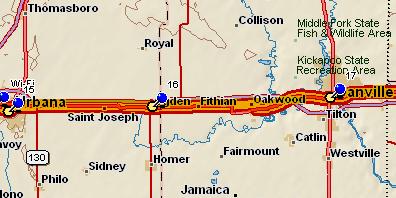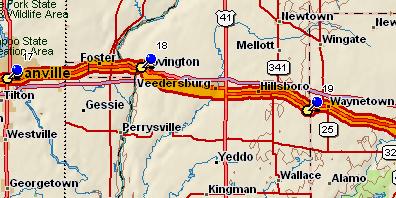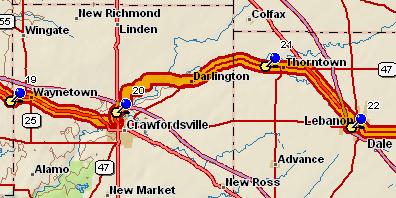Seven days out of Urbana-Champaign, Illinois! As of today I’ve reached Lebanon, at the northwest corner of the exurbs of Indianapolis.
I’ve also reached the half-way point in this journey. The walk — if I can still call it that, given that I’m only walking a few miles of my assigned fifteen each day — is eighty days in duration; and I finished the fortieth day last night.
I didn’t attempt to walk any of the distance, the first two days out of Urbana. My feet were still in such bad shape that it was a challenge simply to walk on them at all. My route ran down a level road bordered with cornfields and soyfields; I drove it slowly, and stopped a few times, to listen to it as best I could, but I pretty much stayed in the car.
 Instead of my original plan to camp in some farmer’s cornfield near Ogden the first night out of Urbana, and to stay in a Danville motel the second night, I went to the Kickapoo State Recreation Area — just four miles north of my planned route — and pitched a tent there for two nights. It was a desirable change for any number of reasons: it saved money, reduced time spent transporting my stuff from one site to the next, gave me more rest time to let my feet heal, and gave me easy access to safe little trails where I could stretch and test my healing foot and ankle muscles.
Instead of my original plan to camp in some farmer’s cornfield near Ogden the first night out of Urbana, and to stay in a Danville motel the second night, I went to the Kickapoo State Recreation Area — just four miles north of my planned route — and pitched a tent there for two nights. It was a desirable change for any number of reasons: it saved money, reduced time spent transporting my stuff from one site to the next, gave me more rest time to let my feet heal, and gave me easy access to safe little trails where I could stretch and test my healing foot and ankle muscles.
Kickapoo S.R.A. is a former strip mine. A local mining company spent most of the first half of the twentieth century digging coal out of the site with steam shovels, leaving behind a hole sixty feet deep. The State of Illinois has done an admirable job of revegetating and stabilizing the slopes on the edges of the hole, and it now makes a quite visually appealing lake. It was good to see how quickly the land can complete at least its first stages of healing when people help it along like that.
But the forest growing in is still just a disturbed mess of secondary growth, trees and saplings and weeds mixed all disorderly together, and I suspect that few if any of the rarer plants and animals have returned. And I doubt that many of the visitors picnicking and rubber tubing and canoeing there, realize that this is the case, or would understand its significance even if they knew. I find myself doing a lot of thinking about the ecological illiteracy of the general public, and the very real costs of this illiteracy, as my journey progresses.
Both Kickapoo S.R.A. and neighboring Danville, Illinois, sit on the edge of the big Vermillion River. Danville’s a decidedly blue collar town, with some huge manses built by the owners’ class on the main drag northward through town. While I was there, rumors of a possible coal miners’ strike filtered in from the towns outside. There’s a Korean War Veterans bridge and a POW-MIA memorial highway: indicators, both of them, of how many kids try to escape the local mines by joining the military, and then wind up coming home in wheelchairs or caskets. Social and economic entrapment have to be counted among the major causes of war —
From Danville into Indiana! The road began to wind, and dipped into wooded areas where ravines or poor soils or property lines made farming less than profitable. Indiana’s woods have always delighted me: the trees, mostly broadleaf, throw a wonderfully black shade of the sort that inspires impressionistic painting. And the land I’ve been passing through — thanks to the glacial till that the last Ice Age left behind — rolls with an utterly sensuous gentleness. I walked as much of it as I possibly could, limping about for a mile or two with my walking stick somewhere along the route once or twice each day.
 The curves and rolls in the road around Covington and Hillsboro (two towns where I managed to walk a good two miles each) were lovely enough to haunt my dreams.
The curves and rolls in the road around Covington and Hillsboro (two towns where I managed to walk a good two miles each) were lovely enough to haunt my dreams.
 Indiana’s also a much wetter state than the ones I’ve previously passed through — at least, this year. Southern Iowa is (by and large) in the fourth year of what it calls a drought; Illinois has been suffering from droughts as well. Indiana’s rivers and fields have been flooding repeatedly this spring. I pitched my tent in Hillsboro and Crawfordsville with a wary eye to the terrain, picking spots high enough not to flood if the skies opened up.
Indiana’s also a much wetter state than the ones I’ve previously passed through — at least, this year. Southern Iowa is (by and large) in the fourth year of what it calls a drought; Illinois has been suffering from droughts as well. Indiana’s rivers and fields have been flooding repeatedly this spring. I pitched my tent in Hillsboro and Crawfordsville with a wary eye to the terrain, picking spots high enough not to flood if the skies opened up.
Last night, in Thorntown, I found myself back in Quaker country. Really back — the first Friends to arrive in the area came there way back in the early nineteenth century. My hostess, a Quaker schoolteacher well past retirement age, lived on the ancestral farm, directly across from an old rural Friends church.
Accidents of politics, alas, made it impossible for me to meet with the members of that Friends church. It was formerly a part of Western Yearly Meeting, which in recent years has taken a swing to the sociopolitical right, disowning a member meeting that dared to record a same-sex marriage and disrecording a pastor, Philip Gulley, who had dared to embrace universalism in his writings.
Western Yearly Meeting, however, was not socially conservative enough for little Sugar Plain Friends Church, where my hostess had been a member, and it withdrew from its affiliation with the yearly meeting because the yearly meeting failed to move quickly enough in disowning the pro-same-sex-marriage meeting and in disrecording Friend Gulley. My hostess had, in her turn, gave up her membership in Sugar Plain because she could not unite with its position on these issues.
— Which of course left me, as a guest of my hostess, and as a member of a yearly meeting (Iowa [Conservative]) that sees nothing wrong with same-sex marriage, with no easy way of getting himself a meeting with the members of Sugar Plain.
My hostess took me to dinner last night at the home of a young couple who are members of Sugar Plain, but more than open enough to still take an interest in the struggles of the rest of our Society. The husband is a consulting electrical engineer, the wife a biologist who is currently taking time out from her career to raise their four small children. They live on a farm where they are experimenting with ways to raise chicken and sheep in a kinder and more ecologically sustainable manner.
No called meeting for discernment in this setting, either — but, over dinner, we discussed the environmental issues that weigh on the couple’s minds — including “peak oil” — and the husband expressed his enthusiasm for the power of small, unified communities, trading amongst themselves, to build more sustainable economies.
This morning I set out for my usual before-driving walk, and was able to walk a full two miles and get back in the car and not feel any pain in my feet. Needless to say, I was delighted.
— And I intend to do more walking later today.
